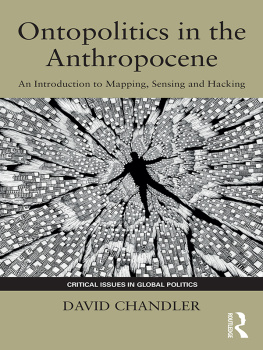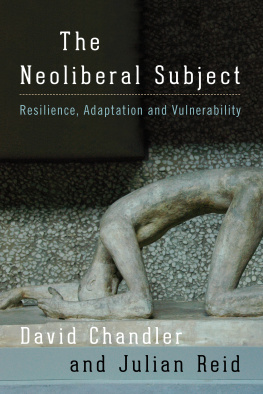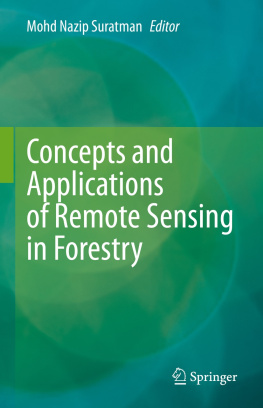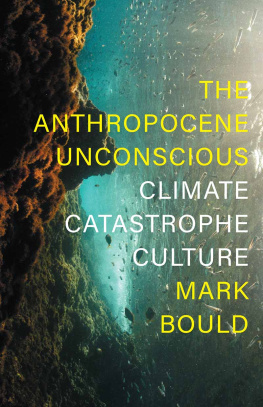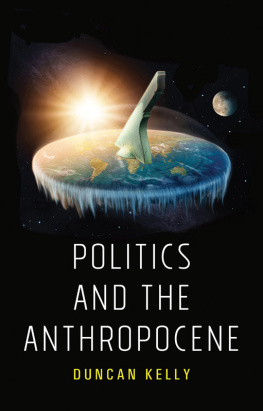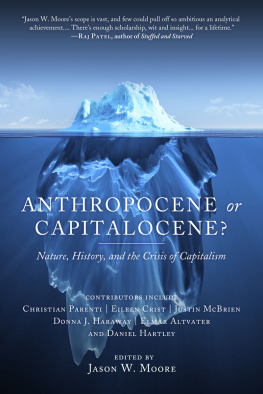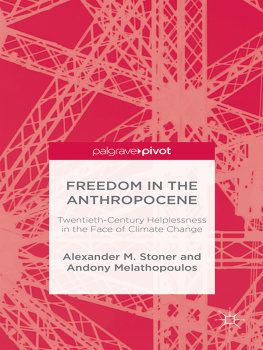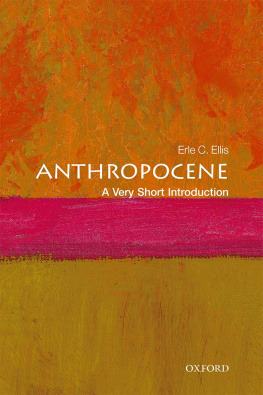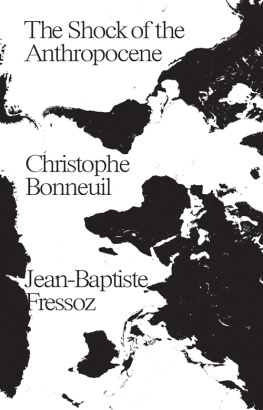If the Anthropocene is to be understood as a condition of malaise, as David Chandler suggests in this sophisticated theoretical engagement with contemporary ontopolitics, it necessarily needs new modes of governance. While mapping and sensing might be understood as modern methods, the promise of hacking and digital activism hold out possibilities for acting that deserve much more attention in the world of new rapidly changing urban vulnerabilities. This volume, by one of the key current philosophers of resilience, offers a preliminary must be read guide to these emerging political potentialities in the ruins of neoliberalism.
Simon Dalby, Balsillie School of International Affairs, Canada
How is it possible that the new metaphysicians of the Anthropocene have greeted the threat of planetary extinction with such affirmation? This is the stirring question that drives Chandlers book. Bringing together policy questions in international relations with contemporary new materialisms, Chandler takes us beyond the entanglements of ticks, slime molds, and ocean currents to ask about the Anthropocenes ontopolitical claims and the postmodern modes of governance they affirm. The result is a stunning exposure of the pragmatic and philosophical stakes of our current condition and an urgent call to contest the affirmative ontopolitics of the Anthropocene. A must read!
Lynne Huffer, Emory University, USA
...Chandlers Ontopolitics of the Anthropocene is one of the most important pieces of analytical scholarship to come out the academy in years. It provides a new framework for understanding the world that is taking shape. Following the human own-goal of the Anthropocene, we are now suborned to let the world govern and guide us. The new orthodoxy celebrates the demise of linear causality and with it conventional modes of knowing and governing. Open to its contributions, Chandler provides an eloquent and penetrating analysis of its limits. He warns of the potential intellectual sterility of the ontopolitical alternatives it entails. Everyone should heed Chandler's urgent call to critically dissect the governing discourse of the Anthropocene and the relation to the world it creates.
Mark Duffield, University of Bristol, UK
Chandler throws himself headlong into the global tempest of our eponymous era. What comes out the other side is a challenging and vital engagement with the Anthropocene that calls on International Relations to pay attention to the world beyond the narrow confines of our geopolitically charged, species narcissism. A must read for those of us beginning to take notice.
Jairus Grove, University of Hawai'i at Manoa, USA
Ontopolitics in the Anthropocene is the culmination of David Chandlers longrunning engagement with contemporary transformations in social and environmental governance. This book is essential reading for anybody interested in understanding novel practices of rule and how they shape and constrain possibilities for critical thought. As he carefully details how a posthumanist affirmation of the Anthropocene straightjackets our political imaginary, Chandler challenges readers to reinvent what critique might become today.
Kevin Grove, Florida International University, USA
ONTOPOLITICS IN THE ANTHROPOCENE
The Anthropocene captures more than a debate over how to address the problems of climate change and global warming. Increasingly, it is seen to signify the end of the modern condition itself and potentially to open up a new era of political possibilities. This is the first book to look at the new forms of governance emerging in the epoch of the Anthropocene. Forms of rule, which seek to govern without the handrails of modernist assumptions of command and control from the top-down; taking on board new ontopolitical understandings of the need to govern on the grounds of non-linearity, complexity and entanglement.
The book is divided into three parts, each focusing on a distinct mode or understanding of governance: Mapping, Sensing and Hacking. Mapping looks at attempts to govern through designing adaptive interventions into processes of interaction. Sensing considers ways of developing greater real time sensitivity to changes in relations, often deploying new technologies of Big Data and the Internet of Things. Hacking analyses the development of ways of becoming with, working to recomposition and reassemble relations in new and creative forms.
This work will be of great interest to students and scholars of international politics, international security and international relations theory and those interested in critical theory and the way this is impacted by contemporary developments.
David Chandler is Professor of International Relations, Department of Politics and International Relations, University of Westminster, UK, and editor of the journal Resilience: International Policies, Practices and Discourses.
CRITICAL ISSUES IN GLOBAL POLITICS
This series engages with the most significant issues in contemporary global politics. Each text is written by a leading scholar and provides a short, accessible and stimulating overview of the issue for advanced undergraduates and graduate students of international relations and global politics. As well as providing a survey of the field, the books also contain original and groundbreaking thinking which will drive forward debates on these key issues.
3. Governmentality
Critical Encounters
William Walters
4. Re-Envisioning Global Development
A Horizontal Perspective
Sandra Halperin
5. Sustainability
Heather M. Farley and Zachary A. Smith
6. Sovereignty as Symbolic Form
Jens Bartelson
7. Resilience
The Governance of Complexity
David Chandler
8. Globalization Revisited
Grahame Thompson
9. Ontopolitics in the Anthropocene
An Introduction to Mapping, Sensing and Hacking
David Chandler
ONTOPOLITICS IN THE ANTHROPOCENE
An Introduction to Mapping, Sensing and Hacking
David Chandler

First published 2018
by Routledge
2 Park Square, Milton Park, Abingdon, Oxon, OX14 4RN
and by Routledge
711 Third Avenue, New York, NY 10017
Routledge is an imprint of the Taylor & Francis Group, an informa business
2018 David Chandler
The right of David Chandler to be identified as author of this work has been asserted by him in accordance with sections 77 and 78 of the Copyright, Designs and Patents Act 1988.
All rights reserved. No part of this book may be reprinted or reproduced or utilised in any form or by any electronic, mechanical, or other means, now known or hereafter invented, including photocopying and recording, or in any information storage or retrieval system, without permission in writing from the publishers.
Trademark notice: Product or corporate names may be trademarks or registered trademarks, and are used only for identification and explanation without intent to infringe.
British Library Cataloguing-in-Publication Data
A catalogue record for this book is available from the British Library
Library of Congress Cataloging-in-Publication Data
Names: Chandler, David, 1962- author.
Title: Ontopolitics in the anthropocene : an introduction to mapping, sensing and hacking / David Chandler.

